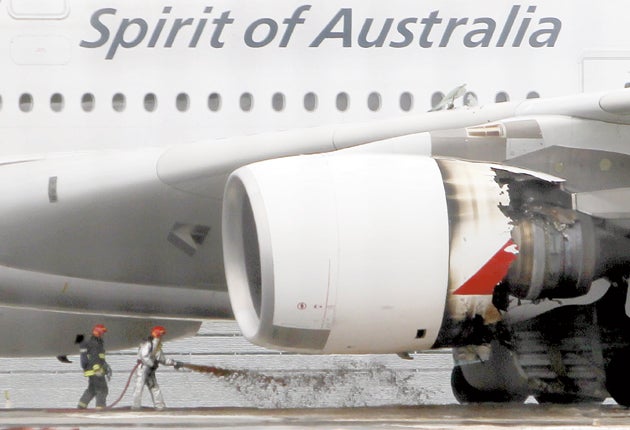Oil fire caused engine blowout, says Rolls-Royce

Your support helps us to tell the story
From reproductive rights to climate change to Big Tech, The Independent is on the ground when the story is developing. Whether it's investigating the financials of Elon Musk's pro-Trump PAC or producing our latest documentary, 'The A Word', which shines a light on the American women fighting for reproductive rights, we know how important it is to parse out the facts from the messaging.
At such a critical moment in US history, we need reporters on the ground. Your donation allows us to keep sending journalists to speak to both sides of the story.
The Independent is trusted by Americans across the entire political spectrum. And unlike many other quality news outlets, we choose not to lock Americans out of our reporting and analysis with paywalls. We believe quality journalism should be available to everyone, paid for by those who can afford it.
Your support makes all the difference.Manufacturing giant Rolls-Royce today said it had identified the faulty part behind an engine failure which forced an A380 superjumbo into an emergency landing and was making efforts to fix the problem.
But the Derby-based company, which is rolling out a programme of inspections across all A380s, admitted the cost of the response would lead to "slightly lower" profit growth, compared with previous forecasts of 4% to 5%.
Rolls said the failure was confined to a specific component in the turbine of the Trent 900 engine, which sparked an oil fire and led to the release of another part - a turbine disc.
Passengers on board Qantas flight QF32 described seeing the engine burst into flames minutes into a journey from Singapore to Sydney last week, scattering debris over Indonesia's Batam island.
The European Aviation Safety Authority yesterday issued an emergency directive demanding regular checks on all Trent 900 engines made by Rolls-Royce.
This forced Qantas, which discovered small oil leaks in engines on three separate aircraft, to prolong the grounding of its A380 fleet.
Singapore Airlines grounded three of its 11 A380s after inspections revealed oil stains and German airline Lufthansa said it would also perform inspections of engines on its superjumbos.
A regime of engine checks is being conducted and the singled-out component will be replaced if required.
Chief executive Sir John Rose, who will step down from the company in March after 26 years, said Rolls' response would eventually bring the whole fleet back into service.
He said: "Safety is the highest priority of Rolls-Royce. This has been demonstrated by the rapid and prudent action we have taken following the Trent 900 incident."
Sir John said the scale of the company's order book and strong balance sheet made Rolls-Royce a "resilient" business.
Investors were reassured by the update, despite the lowered forecast, and the company rebounded from days of losses on the stock market.
Rolls' shares have taken a beating since the engine failure came to light, but the firm soared to the top of the FTSE 100 Index at one stage.
Howard Wheeldon, senior strategist at brokers BGC Partners, said the company had provided sufficient information to calm the market and airlines with A380s.
He said: "In the coming weeks and months we may learn through the ongoing examination whether we are talking about a component quality issue, an engineering design flaw, a materials related failure or whether there is a relationship to heavy wear and tear."
He added Rolls-Royce had offered enough reassurance for investors to believe the problem had been resolved, albeit at a high cost that will "likely run into many millions".
In its trading update, Rolls said a better-than-expected performance in the marine and defence businesses would partially make up for the pressure on its civil arm.
The company said its marine business, which provides power systems to offshore oil and gas, specialist vessel and naval markets, had seen improving demand.
And Rolls said demand from global customers in its defence business was expected to compensate for the loss in revenues from the UK Government following the strategic defence and security review.
The company said its civil aerospace business would hold its market leading position, with aircraft such as the Boeing 787 and business jet Gulfstream G650, both powered by Rolls-Royce engines, entering service over the next few years.
Join our commenting forum
Join thought-provoking conversations, follow other Independent readers and see their replies
Comments